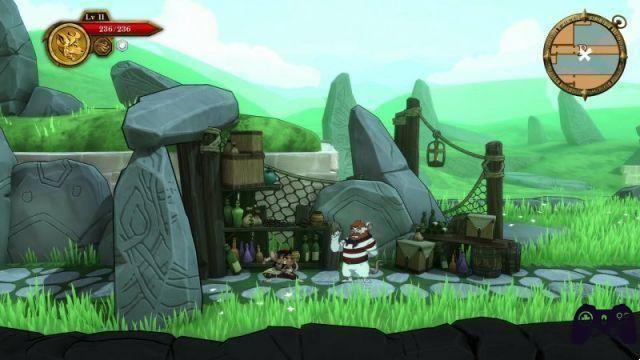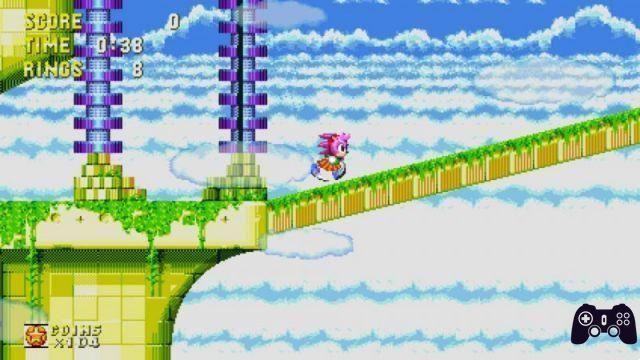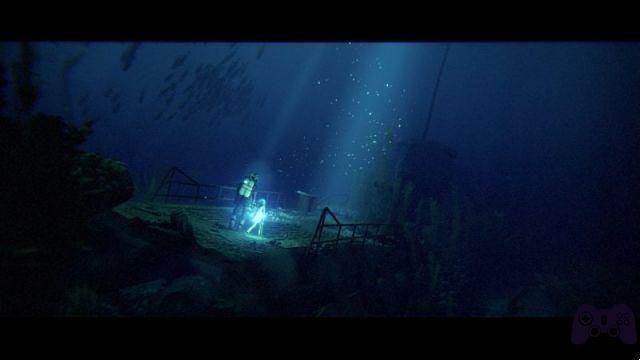A catastrophe occurs that threatens to destroy the planet Ketern, to which we have been sent to search for possible survivors of previous expeditions and, above all, to find and stop the unknown source of energy that is about to turn this remote celestial body into a arid lifeless desert. We are in the year 2766 and apparently, despite the immense technological development that allows us to travel in space, we have not managed to invent a suit that can supply us with oxygen for more than five minutes or energy bars that can sustain us for at least an entire year. day. In the role of Quinn Hicks, agent of the Space Corps of the Congress of the United Worlds, we must ensure that we, the planet and all its inhabitants survive, helped by the android C.A.R.L., who acts as a multifunctional tool. , capable of giving us directions, running scans and more. But will it be worth doing it? To find out you just have to keep reading Beyond contact review.
Script

While we speak with a Ketern resident, Quinn dies. We immediately understand the reason for the sudden death: he ran out of oxygen. Beyond Contact is a game that transmits anxiety from the first moments, even in moments when it shouldn't. Ketern is generated procedurally and we have to explore the local flora and fauna, collect materials and resources and avoid the monsters that populate the different biomes, stuck together as if forming an abstract mosaic. Quinn is constantly hungry and needs oxygen, the latter of which she can get from some bubbles found here and there on the planet. At first she is completely defenseless, but as the hours go by she will be able to equip herself with offensive tools, which will help her in her exploration and will allow her to reach the most inaccessible and distant areas, where the best resources are found. , thus building the entire base equipped with autonomous defenses and means of production. In reality, fighting is not that attractive, since it is enough to use the selected weapon on the enemies in question, without having to perform any special virtuosity, except for some moments of hit-and-run action in which we are clearly outnumbered. . That said, it's best to avoid enemies for as long as possible.
explore It is essential for the gaming experience, because it not only allows us to discover new areas, but also allows us to scan more objects, simultaneously progressing in our technological tree (scans give research points). At first we can only extract materials from some plants, but with the first pickaxe it is possible to obtain basic minerals, which help a lot to increase the variety of buildable objects.
Il the problemWhat, as we have said, is that Beyond Contact generates a certain anxiety, which was probably intended as tension in the designers' plans: the first enemies are relentless and stop chasing us only after we have traveled long distances, resources are distributed randomly and The gameplay has a tendency to be unforgiving. In one game we ended up in a toxic biome, which we couldn't handle yet, so we escaped and ended up in a radioactive biome, then another toxic one, and then a radioactive one again. It seemed like there was no way out. Running like crazy, while the limited resistance of Quinn's suit barely protected us, we arrived half-dead at an alien agglomeration, where we finally died while talking to seek help and information, as told at the beginning of the paragraph.
To survive

The Diablo-style plan and the map with all the resources indicated help a lot to manage Quinn and her needs, because they give a broader view of the area we are in, allowing us to easily identify the resources present. like a good boy supervivencia, Beyond Contact is a continuous collection of resources and construction of new devices, when we are not forced to reach the new objective of the main story, the loop being interrupted only by some simple mission, usually getting from point A to point B. writing, picking something up, or talking to someone and coming back, and from building the actual base that, when unlocked, becomes sort of the fulcrum of the experience. Maybe even too much, since defending her from constant attacks is really difficult and sometimes she ends up strangling the player, forcing him to act as his babysitter, despite having spent a lot of resources defending her.

The goal of the developers was undoubtedly to create a game. very difficult which, despite its survival nature, did not give the player a moment's respite. So the collection of individual resources is very fast and you don't spend hours digging mountains or cutting bushes, as already mentioned the fights are resolved more or less quickly depending on the weapon you wield and you constantly run from one side to the other to hunt for oxygen and food. . The problem is that after a few hours of playing Beyond Contact it starts to get tiring. The entry phase does not last long, given the limited tutorial, the different systems are introduced little by little, but in the long run nothing emerges that makes the experience especially interesting.
Not even the construction system It's even more surprising. It's quite rich, including the ability to customize your base, building support, production, and agricultural and defensive structures, but it doesn't offer anything truly unique compared to the thousand other survival games on the market. There are echoes of Factorio, others of Harvest Moon, but in general we are not very passionate about what we build, so much so that at times it is perceived more as a bottleneck, which prevents us from going and doing something more interesting, than as a feature. the one you really want to spend time with.
Without infamy and without praise

From a technical point of view, Beyond Contact has neither infamy nor accolades. Stylistically it looks like a cartoon science fiction pop, a choice also underlined by the intermediate scenes created, in fact, as comics. Which wouldn't be bad at all if it weren't for the fact that the procedural generation of the maps makes the game world anonymous and, above all, not very organic. There are some more interesting areas, the indigenous structures are well conceived, straight out of years when science fiction was much more naive than modern science fiction, and the base elements are well done, but there's nothing that really stands out , both positively and negatively. The alien vegetation itself, although not without its peculiarities, quickly becomes repetitive and almost never creates interesting landscapes, limiting itself to its function.

La history In itself it would also be interesting, if it weren't for the fact that at some moments it is castrated by the survival systems and you are almost forced to run, skipping dialogues or dedicating yourself less than necessary to exploring certain places, in order not to incur a death. safe. We understand the desire to keep the pressure high, but not everything is managed in the best way and certain limitations end up weighing down the gaming experience instead of enriching it. The essence is that it is difficult to say that Beyond Contact does not try and on many occasions does not do its job, but without ever managing to stand out and without ever showing any strong point that makes it unmissable, almost as if it were trying to do so. do everything, you can't do anything better.
Conclusions
Tested version PC with Windows digital delivery Steam Price 14,99 € Holygamerz.com 6.5 Readers (8) 7.2 your voteAll in all, Beyond Contact is not entirely despicable, but it does not have any aspect that makes it unmissable. At some times it just works, at other times it tries to go up but fails. He wants to be very difficult and he succeeds, but sometimes not in the best way. It is not disastrous, this one is not and it also has its moments. Maybe I just needed more courage.
PRO
- The pace is fast
- The resource gathering and building mechanics work.
- the story is interesting
AGAINST
- It has anxiety-inducing mechanics that can be counterproductive to the experience.
- There is nothing that makes it stand out
- At times it seems that we act as a babysitter for the base.






